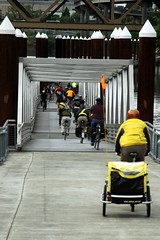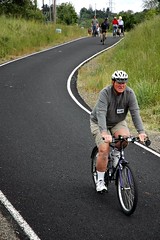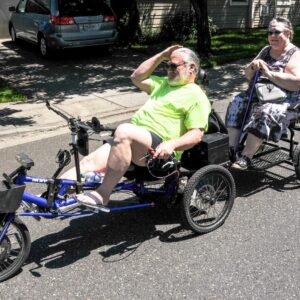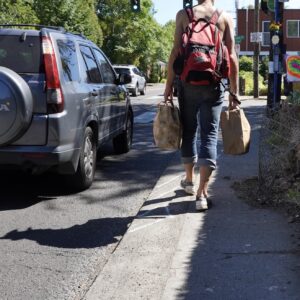Last month we shared the news that the City of Gresham had decided to close the Springwater Corridor Trail at night. They said they were doing it “for everyone’s safety” and to bring the trail in line with their other park facilities.
Opposition to the idea came as soon as it was announced. The concern was raised because for thousands of bike commuters every day, the Springwater is much more than a park, it’s a key transportation corridor.
According to official counts of daily bike traffic on the trail by the City of Portland in 2007, an estimated 2,500 people on bikes use the trail each day (that’s based on a count done at the Oaks Bottom area during peak commuting hours and extrapolated over a 24-hour period. The same count found 1,800 daily riders pass by the trail at SE Spokane.).
The crux of the issue became whether or not the Springwater Corridor Trail should be regulated as a recreational facility or a transportation facility.
“…the Springwater and Gresham/Fairview Trails are principally transportation facilities and their hours of operation cannot be restricted.”
— Jeff Graham, FHWA
Now it appears that the Federal Highway Administration (FHWA) has answered the question. When Metro planner John Mermin heard the news of the Gresham’s decision, he contacted the regional FHWA contact, Satviner Sandhu.
Mermin’s hunch was that, because the Springwater was funded in part by the FHWA’s “Transportation Enhancements” (TE) program, it was bound to certain rules tied to that funding. Mr. Sandhu at the FHWA forwarded Mermin’s question to another FHWA employee in Salem, operations engineer Jeff Graham.
Graham informed Mermin that a similar question arose in the ’90s with the Eastbank Esplanade. Back then, the City of Portland decided to close the Esplanade at night due to safety concerns. However, the FHWA informed the City that the Esplanade could not be closed because it served as a “transportation facility and those facilities do not have restricted hours of operation.”

floats on the Willamette River
is also considered a transportation
facility.
In the case of the Esplanade, it was determined to be a transportation facility because the City used Congestion Mitigation & Air Quality Improvement Program (CMAQ) funds to pay for it. The CMAQ application clearly stipulates that the facility would be built to provide improved air quality in the area by offering a way for citizens to get into downtown by walking and biking.
Now, a similar issue is facing the City of Gresham and their decision to close the Springwater Corridor Trail at night.
The Springwater was funded in part through the FHWA’s “Transportation Enhancement” (TE) funding program. In a reply to Mermin (that was also published on the BTA Blog last night), Graham wrote that according to TE funding guidelines:
“No bicycle project may be carried out (funded) under this section (TE) unless the Secretary has determined that such bicycle project will be principally for transportation, rather than recreation purposes.”
Graham went on to write that (emphasis mine),
“…I’ve concluded that the Springwater and Gresham/Fairview Trails are principally transportation facilities and their hours of operation cannot be restricted. FHWA expects that ODOT (the Oregon Department of Transportation, who doles out TE funds) will inform the City of Gresham that the trails will no longer have restricted hours of operation and will be available for use by the public 24 hours per day.”
Will the City of Gresham will proceed with their closure policy, or if they’ll heed the FHWA’s stance and reverse course like the City of Portland did back in the ’90s?
“We want to make sure we have the right answer before we say anything publicly.”
— Katherine Kelly, City of Gresham transportation planning manager
I reached Katherine Kelly, Gresham’s transportation planning manager, via telephone this morning. She was reluctant to say much about the issue. However, she acknowledged that they are currently in talks with ODOT about the FHWA guidelines and told me, “We just don’t have enough information at this point. We are waiting to hear from both ODOT and the FHWA. We want to make sure we have the right answer before we say anything publicly.” Ms. Kelly said she hopes to have more of a response by next week.
Metro’s John Mermin will update the Multnomah County Bicycle and Pedestrian Advisory Committee at their next meeting on January 14th.
— For more background, see our December 11, 2008 story, City of Gresham moves to close Springwater Trail at night.








Thanks for reading.
BikePortland has served this community with independent community journalism since 2005. We rely on subscriptions from readers like you to survive. Your financial support is vital in keeping this valuable resource alive and well.
Please subscribe today to strengthen and expand our work.
the only closure I saw on Springwater last night was a detour from a bridge north of I205 near gresham. I was able to use the Springwater Coordidor all the way to the Main St. in Gresham.
how will Gresham resolve the problems that led to the closure of the cooridor in the first place?
Great news !!
Thanks for bringing attention to this.
Great news. I am glad to see the updates on this issue.
This could get still even more interesting. By the way, was Gresham’s announcement and decision to implement closure hours for the Springwater, consistent with those of other Gresham city parks, Gresham Park administrations decision? Was it a decision made by the city’s transportation management division? Or, was it a Gresham City Council decision?
It’s kind of annoying that Gresham’s government didn’t do some research to determine the range of authority available to them to make such a closure, before actually going ahead and closing it. Doing so might have saved a lot of time.
Gresham probably has some sincere concerns about people’s safety on the Springwater. Gresham, after all, was the city that took the initiative to add its own security to MAX light rail, after a succession of violent assaults on the train and at stations, to which Tri-met had been slow to adequately respond to.
Though, in terms of the Springwater, maybe Gresham is concerned about liability. If it’s a park as well as a transportation corridor, yet they feel unable to designate the resources to adequately patrol, during late night/early morning hours, the section of the corridor running through their city, it could be they felt that closure was their unavoidable obligation.
Maybe Gresham could institute a bike-patrol to keep the trail safe at night? I’m sure it is hard to access by car, and I know that neighbors of the trail in SE Portland and in Gresham experience property crime that they attribute in part to the trail.
Well, Gresham Parks and Recreation is officially relieved of the problem since it is no longer a park. Multnomah County now is responsible for the root problem: security.
As this “Officially” a transportation corridor perhaps its time that it gets the respect it deserves: a police patrol presence.
Just we as a city can not expect crime not to occur on the MAX lines if there is no police presence, we also can not treat this as some lightly used backwoods trail when official counts bear this out as a major transportation corridor.
Well she seemed very keen on stalling. I wish they’d been that thorough before they’d decided to try to impose restrictions the first place!
awesome
summer midnight springwater bike rides under a full moon!
Glad to hear it’ll be re-opened. Safety is a concern, of course, and maybe instead of closing it down Gresham could consider police bike patrols at night. I was harassed and threatened on the 205 trail last April in the middle of the day on a weekend. That experience along with never seeing a uniformed, official police officer (not a private security officer, though I’ve never seen one of them, either) patrolling the trails has led me to opt out of cycling these trails alone.
This illustrates some of the problems with grade separated trails, or multi-use paths, or MUPs. Since they are typically overseen by parks departments, they are treated as recreational facilities rather than as serious transportation links for bicyclists. The security situation raised here and in previous articles is another problem. Yet the BTA wants more MUPs.
Having said that, say, hypothetically, that MUPs are a good idea, and that the BTA is right in advocating for them. In that case, I would have expected the BTA to have already gone to court to get an injunction preventing Gresham from closing this trail at night. Yes, referring to the Q&A from the TE paperwork which says that they can’t do that, is a step in the right direction. But, as Jonathan reports, Gresham still hasn’t backed away from closing the MUP at night.